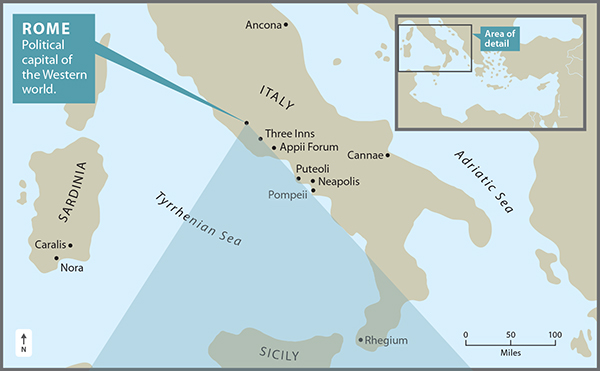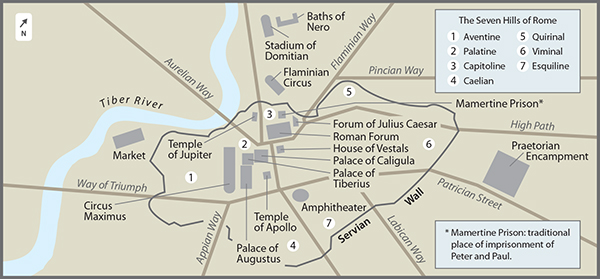Paul explains the global message of the gospel.
The Book of Romans was written to explain the core of the Christian faith. While the first five books of the New Testament tell Jesus’ story, Romans explores Jesus’ message. The book’s author, the apostle Paul, shows that the gospel is more than good deeds or lofty moral sentiments. It is truth, with substantial intellectual content. It challenges how people think, transforms their worship, and imparts new insight into daily life.
Taken as a whole, Romans may be seen as a carefully constructed argument that answers a crucial question: Why did Jesus die? Paul used his training as a teacher of the Law to analyze complex theological issues. Romans reminds us that the gospel is big enough to deal with the weighty concerns of the world—social justice, human dignity, the earth’s ecology, ethical tensions arising from advances in technology, global war, humanity’s capacity for self-destruction, and the ultimate destiny of all people and of the very cosmos itself. Romans offers the big picture of God’s salvation. It extends to:
• All aspects of life. The gospel is not merely personal or private. It is also public and universal. It is deeply relevant to government, science and technology, and the architecture of world systems.
• All times and places. The gospel is an overarching presence in the grand sweep of history, from creation to Christ to the culmination of the world. At every turn, God is carrying out His plan for redemption.
• All kinds of people. The gospel is meant for Jews and Gentiles, men and women, the powerless and the powerful, the good and the bad. All have a place in God’s story of salvation.
In this letter Paul mentions the church in Rome (Rom. 1:7) but he speaks to a general readership. Paul did not start the church in Rome and had never visited the city at the time of his writing (1:13–15). He intended to stop over in Rome, however, on his way to Spain (15:22–24; see also Rome’s profile at Acts 28:16).
While we know few specifics about Paul’s readers in Rome, we know much about their first-century life. Rome’s influence extended from Britain to parts of Africa and from Spain to Persia. This enormous empire was governed by a system of provincial governors, petty kings, and vassals of Rome. The Pax Romana (“Roman Peace”) and a superior road system facilitated transportation and trade and also enabled the rapid spread of Christianity.
The Romans were in love with power. Rome’s government, economy, infrastructure, and defense systems were formidable enough to last a thousand years. Perhaps that explains why Paul began his description of the gospel in terms of power—God’s power to save (Rom. 1:16).
Rome treated its Caesars like gods, and they held dominion over far-flung territories and peoples. But the Book of Romans affirms Christ as supreme Lord over all creation: over the past (chs. 3–5), over the present (chs. 6–8), over the environment (ch. 8), over the nations (chs. 9–11), and over daily life in a complex society (chs. 12–16). Though the world is corrupted and languishing under the dominion of sin, it yearns for the truth of the gospel—and the gospel is for the world. Humanity’s power to destroy is transcended by Christ’s power to restore.
Using the customary format of his time, Paul opens his letter to the Romans by identifying himself as the author (1:1). His authorship of Romans is seldom challenged. He likely wrote the letter during his third missionary journey, possibly from Corinth, where he stayed for three months during the spring of A.D. 56 or 57. He informed the Romans of his plans to visit them on his way to Spain after delivering a gift of money to the church at Jerusalem (15:24–28).
Key Verses in Romans
• “I am not ashamed of the gospel of Christ, for it is the power of God to salvation for everyone who believes” (Rom. 1:16).
• “All have sinned and fall short of the glory of God” (Rom. 3:23).
• “Abraham believed God, and it was accounted to him for righteousness” (Rom. 4:3).
• “Having been justified by faith, we have peace with God through our Lord Jesus Christ” (Rom. 5:1).
• “God demonstrates His own love toward us, in that while we were still sinners, Christ died for us” (Rom. 5:8).
• “The wages of sin is death, but the gift of God is eternal life in Christ Jesus our Lord” (Rom. 6:23).
• “O wretched man that I am! Who will deliver me from this body of death? I thank God—through Jesus Christ our Lord!” (Rom. 7:24, 25).
• “There is therefore now no condemnation to those who are in Christ Jesus” (Rom. 8:1).
• “All things work together for good to those who love God, to those who are the called according to His purpose” (Rom. 8:28).
• “If you confess with your mouth the Lord Jesus and believe in your heart that God has raised Him from the dead, you will be saved” (Rom. 10:9).
• “Present your bodies a living sacrifice, holy, acceptable to God, which is your reasonable service” (Rom. 12:1).
• “Do not be conformed to this world, but be transformed by the renewing of your mind, that you may prove what is that good and acceptable and perfect will of God” (Rom. 12:2).
• “Do not be overcome by evil, but overcome evil with good” (Rom. 12:21).
Rome

